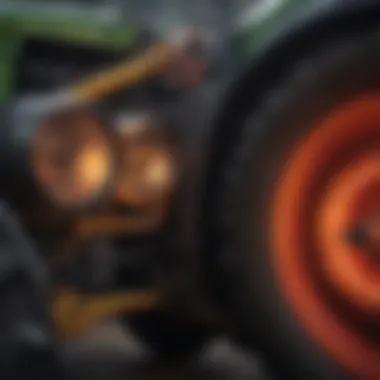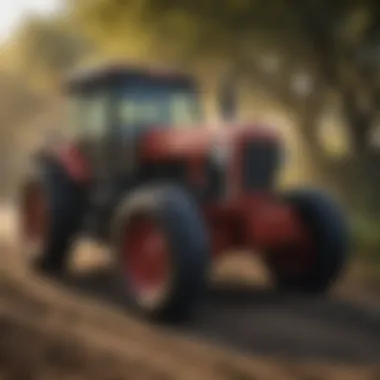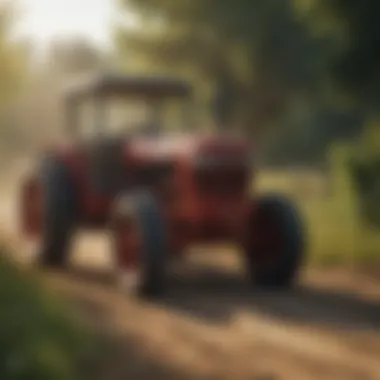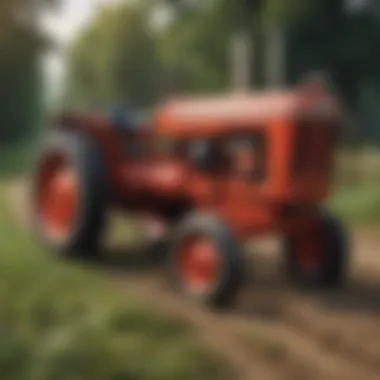Understanding Tractor VIN Lookup: A Comprehensive Guide


Intro
In the world of agriculture, tractors play a crucial role in enhancing efficiency and productivity. For anyone looking to buy or sell a tractor, understanding the Vehicle Identification Number (VIN) is essential. The VIN is unique to every tractor, just like a fingerprint. It provides valuable information about the machine's history, specifications, and safety recalls. This guide aims to provide profound insights into tractor VIN lookup, ensuring that farmers and tractor enthusiasts comprehend its significance.
Key Concepts and Terminology
Basic Definitions
To grasp the concept of VIN lookup, it's important first to understand the basic definitions associated with it. The Vehicle Identification Number consists of 17 characters that combine letters and numbers. Each section of the VIN offers insights into the tractor’s make, model, year of manufacture, and other important data.
Here are the main components of a VIN:
- World Manufacturer Identifier (WMI): The first three characters that indicate the manufacturer.
- Vehicle Descriptor Section (VDS): Characters four through eight describe the vehicle type, model, and body style.
- Vehicle Identifier Section (VIS): The last eight characters serve as a unique identifier for the specific vehicle.
Historical Context
Understanding the historical context of VINs enriches the knowledge surrounding tractor identification. The standardization of VINs began in 1981, requiring all manufacturers to adopt a consistent format. This move aimed to improve vehicle identification and streamline tracking for recalls and registrations. For tractors, this has led to enhanced safety measures and better access to service records.
Practical Applications and Techniques
Step-by-step Guides
Performing a VIN lookup is relatively straightforward, yet many may not know how to initiate this process. Here are the basic steps:
- Locate the VIN: The VIN can be found on the tractor's body, often near the driver's seat or on the frame.
- Choose a VIN Lookup Tool: There are several online platforms that provide VIN lookup services. Websites like en.wikipedia.org or specialized tractor databases are good options.
- Input the VIN: Enter the VIN correctly into the chosen search tool, and initiate the search.
- Review the Report: Analyze the report generated on your tractor. It will usually detail safety recalls, previous ownership, and more.
Case Studies
To further illustrate the importance of VIN lookups, consider the following case studies:
- A farmer who purchased a used tractor discovered through a VIN lookup that the vehicle had been involved in multiple recalls. He was able to address these promptly, ensuring safety for his operations.
- Another case involved a buyer of a vintage tractor who found out through the VIN details that the model they were interested in was rare. This knowledge increased the value of the tractor for resale.
"Knowing the VIN of your tractor can save you from future headaches and facilitate informed decisions."
Recent Innovations and Trends
Technological Advancements
Technological innovation in agriculture is transforming how VIN lookups are performed. Many software applications now integrate VIN analysis with data on machinery performance, helping farmers track maintenance schedules and enhance operational efficiency.
Sustainable Practices
As the agriculture sector moves towards more sustainable practices, understanding VINs contributes to better tracking of machinery that follows environmentally friendly standards. This includes awareness of emissions and compliance with sustainability regulations.
Finally, understanding tractor VIN lookup is not just about numbers. It offers insights that have the power to elevate farming practices while ensuring safe and responsible usage of machinery.
Foreword to Tractor VIN Lookup
In the realm of agriculture, the importance of understanding a tractor's Vehicle Identification Number (VIN) cannot be overstated. VINs serve as a unique identifier for each tractor, much like fingerprints for humans. Through this number, one can glean crucial insights that inform purchasing, ownership verification, and safety checks. Such awareness acts as a protective measure, aiding farmers and enthusiasts in navigating the complexities of tractor ownership and transaction.
Definition of VIN and Its Importance
The Vehicle Identification Number (VIN) is a 17-character code that encapsulates essential information about a tractor. Each section of the VIN specifies details such as the manufacturer, model, and year of production. This code provides a reliable way to trace the history of a tractor, making it essential for prospective buyers. Knowing how to interpret the VIN can help identify not just the origin of the machinery, but it also reveals information about any past accidents or repairs. Ultimately, understanding the VIN ensures that buyers make informed choices, reducing the risks associated with purchasing used machinery.
Overview of VIN Lookup Services


Numerous online services facilitate VIN lookups, each providing unique features and data. These services range from simple databases to extensive reports that include ownership records, safety recalls, and historical maintenance details. Users can easily access these tools via their websites, often for free or for a nominal fee. Popular services include the National Highway Traffic Safety Administration (NHTSA) and various dealership websites that specialize in agricultural machinery. Understanding the variety of services available is crucial, as it allows users to choose the most appropriate resource for their needs.
"A thorough understanding of VIN lookup services can unlock a wealth of information, empowering users to verify the integrity and safety of their machinery."
Taking the time to familiarize oneself with VIN lookup services can prevent costly mistakes in the long run. Various platforms not only offer comprehensive insights into vehicle history but also enhance one's grasp of potential legal implications surrounding ownership and resale. Whether for personal use or professional operations, mastering the nuances of tractor VIN lookup is a vital part of modern agricultural management.
The Structure of a Tractor VIN
Understanding the structure of a Tractor VIN is essential for anyone involved in the buying, owning, or selling of tractors. A VIN serves as the unique identifier of a vehicle. In this context, it provides insight into the tractor’s specifications, history, and more.
Each VIN is composed of 17 characters that follow a specific format, which conveys important information about the tractor. Knowing how to read this can greatly benefit tractor owners and prospective buyers. This section will delve into the basic components of the VIN and offer guidance on how to decode it effectively.
Breaking Down the VIN Components
A Tractor VIN can be broken down into several distinct parts. Understanding these components is crucial. The structure generally includes:
- World Manufacturer Identifier (WMI): The first three characters designate the manufacturer or country of origin.
- Vehicle Descriptor Section (VDS): Characters four to nine provide information regarding the tractor's model, body type, engine size, and other important features.
- Vehicle Identifier Section (VIS): The final eight characters include unique identifiers and production details, helping to trace specific tractors.
Familiarity with these components allows tractor enthusiasts to extract a wealth of information regarding manufacturing specifics, which can be useful during transactions or for personal records. Additionally, knowing the component meanings can aid in the identification of potential issues during inspections.
Decoding the Characters
Decoding the 17 characters of a VIN requires attention to detail. Each character bears significance:
- Characters 1-3 (WMI): Identifies the manaufacturer and where it was made. For instance, a VIN starting with "1G1" could indicate a General Motors vehicle made in the USA.
- Characters 4-8 (VDS): Together, they provide details about the model, type, and features. A potential buyer can recognize if the tractor has essential qualities needed for specific tasks.
- Character 9: This is a check digit, unique to each tractor. It verifies that the VIN is valid.
- Characters 10-17 (VIS): The production year, assembly plant, and the serial number are included here. This information might be crucial for warranty during repairs or recalls.
"Understanding your tractor's VIN can lead to informed decisions and better maintenance strategies."
Knowing how to decode each segment not only simplifies the lookup process but also gives buyers a comparative advantage. Assembling such knowledge can potentially negate risks associated with purchasing used tractors, benefiting both buyers and sellers in the agriculture market.
Benefits of Conducting a VIN Lookup
Performing a VIN lookup offers several advantages that serve individuals in the agriculture sector, including farmers, buyers, and enthusiasts. Understanding these benefits can facilitate better decision-making regarding tractors. Each feature contributes to a comprehensive view of what it means to look into a tractor's history and condition.
Verification of Ownership
One of the primary reasons for conducting a VIN lookup is to verify ownership of the tractor. This process helps ensure that the seller is indeed the rightful owner of the vehicle. Verifying ownership can prevent potential disputes that may arise from purchasing stolen or misrepresented equipment. This step is crucial for anyone looking to buy a tractor, whether for personal use or for business. When a seller provides the VIN, prospective buyers can check records to confirm that the vehicle is associated with the seller’s identity and that any lien is settled. This verification fosters a safer and more trustworthy marketplace.
Identification of Safety Recalls
Another significant advantage of a VIN lookup is identifying any safety recalls that may have been issued for the tractor model. Manufacturers often release recall notices for equipment that may pose safety risks to users. By searching the VIN, buyers can determine if their prospective tractor has any outstanding recalls.
Addressing safety recalls is critical as it can impact the operability and safety of the tractor. Ignoring such recalls may lead to accidents or equipment failures, which could have been avoided. Understanding the recall history ensures farmers and operators prioritize safe and dependable machinery.
Assessment of Vehicle History
Lastly, assessing the vehicle history through a VIN lookup provides insight into the past of the tractor. This includes important information about previous ownership, any recorded accidents, and maintenance history. Collecting this data allows potential buyers to make informed assessments regarding the tractor's condition and longevity.
For example, if a tractor has a history of frequent repairs or significant accidents, it may indicate potential future problems. On the other hand, a well-maintained tractor with a clean history can be a solid investment. Therefore, understanding the vehicle history not only informs potential buyers about the reliability of the tractor but also assists in estimating a fair market price.
"A thorough VIN lookup not only saves you money but also ensures you're making a conscientious decision about your agricultural tools."
In summary, conducting a VIN lookup is not just a precaution but a necessary step in the buying process for tractors. It fortifies ownership verification, raises awareness of safety recalls, and reveals significant historical data, all contributing to a wiser purchase decision.
How to Perform a Tractor VIN Lookup
Understanding how to perform a Tractor VIN lookup is essential for any individual interested in tractors. This process aids in verifying ownership and confirming the condition of a tractor before a purchase. It empowers buyers with the necessary information, thus aiding informed decision-making. Knowing how to locate the VIN and utilizing available tools can save potential buyers time and money.


Finding the VIN on Your Tractor
Locating the VIN on a tractor is the first step in the lookup process. The VIN is typically found in specific locations, depending on the make and model of the tractor. Common places to search include:
- On the dashboard, near the steering wheel.
- On the engine block.
- Inside the door frame or on the driver’s side door.
Understanding these locations can help ensure you find the VIN quickly and accurately. If the VIN is worn or not visible, consult the tractor’s manual for guidance. Recording the VIN correctly is crucial for the subsequent steps in the lookup process.
Using Online VIN Lookup Tools
Once you have the VIN, the next step is using online VIN lookup tools. Many websites offer services that provide detailed information based on the VIN entered. Some trusted online platforms include:
- Carfax
- Autocheck
- National Insurance Crime Bureau
These platforms allow users to obtain details like ownership history, accident reports, and any recalls associated with the tractor. To use these sites, simply enter the VIN in the designated field, and the tool will generate a report. It’s important to choose reputable services to ensure accurate and reliable information.
Engaging Professional Services
In cases where more comprehensive data is needed, engaging professional services might be beneficial. Some individuals may prefer to consult with experts such as:
- Dealers who specialize in tractors
- Vehicle history report services
Professionals can provide insightful knowledge about the tractor and its history that online tools may not cover. These services can also verify any discrepancies in the information gathered online. Partnering with professionals ensures a thorough understanding of the tractor’s status and can lead to more confident purchasing decisions.
"Performing a thorough VIN lookup can save buyers from future headaches and financial loss."
By understanding and executing these steps effectively, individuals can significantly enhance their buying experience and ensure they're making informed choices regarding their tractors.
Understanding the Information Retrieved
Understanding the information retrieved from a Tractor VIN lookup is vital for anyone involved in purchasing, maintaining, or selling tractors. This knowledge not only streamlines the transaction process but also enhances the decision-making capabilities of the buyer or seller. The information parsed from a VIN holds significant implications about the tractor's past, technical specifications, and any potential constraints related to ownership.
Historical Ownership Data
Historical ownership data is a cornerstone of the information derived from a VIN lookup. It provides insight into how many owners the tractor has had over the years. This data can indicate the reliability of the tractor and help predict its future performance. A tractor that has changed hands frequently may suggest underlying issues or heavy use, raising red flags for prospective buyers.
Moreover, understanding previous ownership may unveil the usage patterns—whether the tractor was used primarily for agricultural purposes or other, possibly harsher, applications. All these factors can significantly affect the resale value and operational effectiveness of the tractor. By examining this data, buyers can make informed choices, ensuring long-term satisfaction with their investment.
Accident and Damage Reports
Accident and damage reports are critical for evaluating the condition of a tractor. These reports often provide a detailed history of any incidents that have occurred, ranging from minor accidents to major structural damages. When engaging in a VIN lookup, accessing this information can help farmers or enthusiasts distinguish between a well-maintained tractor and one that has suffered significant wear and tear.
Additionally, knowing whether a tractor has a history of accidents can inform potential buyers about future risks. A tractor that has been in multiple accidents may harbor hidden issues that are not immediately visible. Therefore, this aspect of the VIN lookup process is essential for assessing not only the current condition but also potential future costs in repairs or replacements.
Specifications and Features of the Tractor
The specifications and features of the tractor reveal much about its capabilities and suitability for particular tasks. A VIN lookup can provide detailed information about engine size, horsepower, model year, and any factory-installed features that are pertinent to its operation.
Understanding these specifications helps farmers determine if the tractor meets their specific needs. For instance, knowing the horsepower can clarify if the tractor is suitable for heavy tilling or hauling. Furthermore, this information can influence purchasing decisions and help in comparing different models, maximizing the efficiency of their agricultural operations.
In summary, the information retrieved from a Tractor VIN lookup can greatly impact the buying, selling, and operational elements that surround tractor ownership. By examining historical ownership data, accident reports, and specifications, stakeholders gain valuable insights that facilitate informed decisions.
Legal Implications and Considerations
Understanding the legal implications surrounding Tractor VIN lookup is essential for buyers, sellers, and owners. Awareness of these implications aids in making informed decisions that have lasting effects on ownership and vehicle history. The significance lies not only in ensuring a smooth transaction but also in complying with legal requirements that govern vehicle registration and transfer of ownership.
VIN and Title Issues


The VIN is deeply connected to the title of the tractor. This connection means that any discrepancies between the VIN and the title can lead to significant issues. When a tractor is bought or sold, the VIN must match the information found on its title. If it does not, the buyer might face legal repercussions, including the possibility of the vehicle being considered stolen.
Moreover, a mismatched VIN can complicate the registration process. For example, if an owner tries to register a tractor with an incorrect VIN, they may find themselves facing fines or additional paperwork. In some cases, legal action might be necessary to rectify the situation. Therefore, confirming the VIN and ensuring that it corresponds with the title is a crucial step in any transaction involving tractors.
Potential Consequences of Title Issues:
- Ownership Disputes: If the VIN does not align, it might lead to claims from previous owners.
- Legal Fees: Rectifying title discrepancies may involve significant legal costs.
- Insurance Problems: Inaccurate VIN information can hinder the insurance process, complicating claims if an incident occurs.
Regulations Surrounding VIN Lookup
Compliance with regulations is vital when conducting a VIN lookup. There is a myriad of regulations concerning how VIN data can be accessed, shared, and used. In many jurisdictions, using this information for fraudulent activities, such as cloning vehicles or committing identity theft, is illegal and punishable by law.
Additionally, various laws protect personal information linked to the VIN. This means individuals conducting VIN lookups must be cautious about how they gather and disseminate any data they retrieve. Potential issues may arise if one shares or misuses personal information, possibly leading to lawsuits or criminal charges.
Key Regulatory Considerations Include:
- Data Privacy Laws: Always ensure compliance with regulations such as the General Data Protection Regulation (GDPR) when dealing with personal data.
- Use of Data: Only use information obtained through VIN lookups for legitimate purposes, such as verifying ownership or checking safety recalls.
- Restricted Services: Be aware that some VIN lookup services may operate in gray areas of the law, so it's wise to utilize reputable, recognized sources.
Important Note: Engaging in VIN lookup without consideration of legal standards can have considerable repercussions. Commit to understanding the legal landscape before attempting any lookups.
Challenges in VIN Lookup
Understanding the challenges associated with VIN lookup is essential for anyone involved in purchasing, selling, or maintaining tractors. This process is not without its complications, and being aware of these can significantly impact an individual's ability to make informed decisions. The following points highlight critical issues that may arise during a VIN lookup.
Issues with Legibility and Damage to VIN
One significant hurdle in conducting a VIN lookup is the legibility of the VIN itself. The Vehicle Identification Number is usually engraved on the tractor’s chassis, often in places that are exposed to dirt, moisture, and general wear and tear. As tractors operate in rugged environments, it's not uncommon for the VIN to become partially obscured or damaged over time. In such cases, when the characters are not clearly visible, it complicates the lookup process and may even render it impossible.
- Surface damage: Scratches, rust, and dirt accumulation can obscure important parts of the VIN.
- Location challenges: Some tractors have VINs located in less accessible areas, making it tough for users to visually confirm the number.
When attempting to retrieve information from a damaged VIN, it may be necessary to engage professional services. This can involve inspection by a trained mechanic or using specialized equipment to read the VIN. However, this creates additional costs and time delays for the user, which might be frustrating, especially when dealing with potential transactions.
Scams and Misleading Information
The digital landscape has unfortunately made it easier for scammers to exploit unsuspecting buyers. Individuals conducting VIN lookups may encounter misleading information. This can severely compromise the reliability of the lookup process. Some potential pitfalls include:
- Fake VIN lookup websites: There are numerous online platforms that claim to provide extensive reports on tractors. However, not all of them are legitimate. Some may offer incomplete data or inaccurate reports, resulting in poor decision-making.
- Impersonation of trusted sources: Scammers may create websites that mimic known VIN lookup services, luring users into providing personal information, often leading to identity theft.
- Inaccurate accident reports or ownership history: Misinformation about a tractor's past can lead to financial loss. If an individual relies on a fraudulent report, they might end up purchasing a vehicle with hidden problems or legal issues.
It is crucial for buyers to verify the authority and authenticity of the source from where they obtain VIN information. Trust but verify should be the guiding principle.
In summary, being vigilant about the legibility of the VIN and the potential for scams is vital for anyone looking to conduct a thorough VIN lookup. Recognizing these challenges not only aids in avoiding pitfalls but also enhances the buyer's ability to secure a reliable and safe investment.
The End: Significance of Tractor VIN Lookup
The process of Tractor VIN lookup is not merely a routine check, but a vital step in preserving the integrity and safety of ownership in the agricultural sector. Understanding the nuances of a Vehicle Identification Number (VIN) provides essential insights for farmers and enthusiasts alike. This conclusion synthesizes the overarching themes presented throughout the article, highlighting its importance for informed decision-making and risk management.
Summarizing Key Insights
The key insights derived from understanding Tractor VIN lookup can significantly influence purchasing and ownership experience. Some critical highlights include:
- Ownership Verification: Knowledge of the VIN secures the legitimacy of ownership, preventing the risk of acquiring stolen or conflicting interests in the property.
- Safety Recalls: Regular checks using VIN can unearth important safety recall notices that may not be apparent otherwise. This ensures the safety of equipment and those operating it.
- Historical Data: A comprehensive history can be obtained, including details on past accidents and service records. This data gives farmers a clearer understanding of what they are investing in.
" VIN lookup serves not just as a protective measure but as a strategic advantage in the buying process. "
With these insights, it becomes evident that a VIN lookup is essential for anyone looking to invest in agricultural machinery.
Encouraging Informed Decision-Making
Informed decision-making is critical, especially in the agricultural sector where equipment often represents a significant investment. By understanding the significance of VINs, individuals can approach transactions with confidence. Engaging in VIN lookup equips users with knowledge that goes beyond mere transaction value. It fosters a culture of diligence and responsibility among buyers and sellers.
- Research Before Purchase: Prioritize researching fully before making a purchase decision. Taking the time to lookup a VIN can reveal hidden issues that could affect long-term ownership.
- Utilize Resources Wisely: Many online tools and resources are available for VIN checks. Utilize these effectively to gain a complete picture of the vehicle.
In summary, the significance of Tractor VIN lookup lies in its ability to transform the vehicle buying and ownership experience into a more transparent and secure process. By considering the insights and applying them to decision-making, farmers and enthusiasts can navigate their agricultural endeavors with greater assurance.















